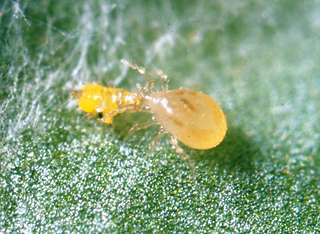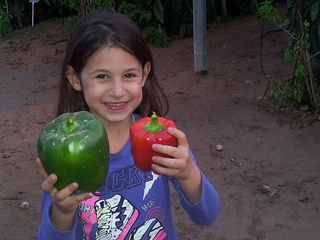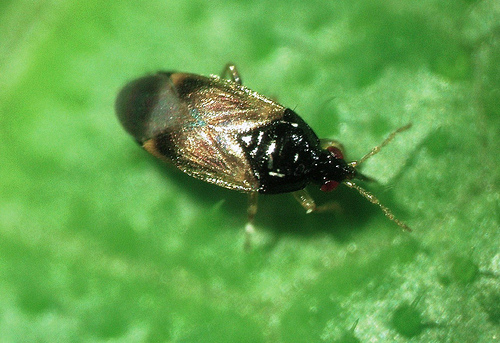By Avigayil Kadesh
Farmers in Israel’s largest vegetable-growers’ marketing cooperative use a unique cocktail of four predatory insects to protect their crops from getting eaten or infested by harmful bugs.
This organic method costs more than chemical pesticides, but for farmers like Rami Sadeh, who has four young children, the health benefits far outweigh the costs. And he figures that consumers overseas – where half of the produce raised in the Arava region is sold -- feel the same way.

This predatory mite replaces chemical pesticides. Photo by Daniel Lev
“We use a technique called ‘integrated pest management,’ IPM, which means the use of chemicals is very limited,” says Sadeh, the staff agronomist at Yofi Shel Yerakot (“Beauty of Vegetables”) at Moshav Ein-Yahav in southern Israel’s Arava Desert.
“We usually use natural enemies of insects that cause damage, and if we do spray it’s only on a small scale for the one or two plants with high infestation. It costs us more money per dunam, but we can sleep well knowing we are not using chemicals.”
The notion of using one natural creature to control another was pioneered in Israel about a decade ago, adds Sadeh, whose surname means “field.” Today there are two companies that raise and sell the predatory insects to farms in Israel and elsewhere – Bio-Bee Biological Systems at Kibbutz Sde Eliyahu, and a similar company at Kibbutz Yad Mordechai.
“It took farmers time to see that they can rely on this technique,” says Sadeh. “At the beginning, the problem was proving that IPM could do the job. Now, almost 100 percent of the farmers in the Arava are using this technique.”
After a career in the chemical industry, Sadeh moved to Ein-Yahav four years ago and immediately started growing melons, peppers and eggplants using IPM, “because I knew it works.”
Like salting a sandwich
Some 34,000 tons of peppers, watermelons, melons, tomatoes and other vegetables grow in protected greenhouses, net houses and tunnels in Ein-Yahav’s 120 farms. Peppers are the biggest crop in the Arava, accounting for 70% of the region’s agricultural yield.

This Moshav Ein-Yahav green pepper, grown with natural pest control, made the Guinness World Records registry.
But the problem with peppers is a tiny, highly destructive pest called the thrip. Thrips get into the pepper plants’ flowers and harm the developing fruit as well as spreading plant viruses.
Instead of blanketing the plants with toxic pesticides, Beauty of Vegetables member farmers simply let the Orius laevigatus do its job. This “pirate bug” has a hearty appetite for thrips, leaving the plant itself alone.
The Orius, and the swirskii and persimilis mites that eat up other harmful bugs, come packaged in containers resembling pepper or salt shakers, says Sadeh. “Every one meter, you sprinkle it on the leaf of the pepper like you’d salt your sandwich.”
 The Orius eats harmful thrips. Photo by Daniel Lev
The Orius eats harmful thrips. Photo by Daniel Lev
The fourth IPM component, a parasitic wasp, arrives in a box that just has to be opened to free the insect. The wasps fly out in search of the aphids that they crave. Aphids, sometimes called “plant lice,” destructively suck the sap from crops.
“The predatory wasps lay their eggs in the body of the aphid and the larva grows inside the aphid and kills it,” Sadeh explains.
Safer vegetables
Though Ein-Yahav is one of the biggest moshav farming communities in Israel, and Arava farms supply more than 60 percent of total Israeli exports of fresh vegetables, Beauty of Vegetables also buys citrus, lettuce, cabbage, carrots and potatoes from farmers elsewhere in Israel. All these farms use integrated pest management, according to Sadeh.
Under CEO Daniel Lev, the marketing cooperative abides by a biological control protocol that includes washing all the picked produce and sending representative samples to a lab to check for bacteria and pesticide residue. The growers are using new equipment that allows the identification of hundreds of pesticides in a single test. They can detect a single chemical residue among a trillion other vegetable components.
For one month every summer, all Ein-Yahav growing areas are covered with netting or special plastic and left fallow. This unique method, says Sadeh, assures that the soil is cleared of bugs and viruses before the new planting begins.
“When there is nothing green in your plot, it makes a vacuum for the insects, and so they die off. In August, you start the season without insects and without the need to spray,” he explains.
The summer sun’s heat is magnified by the covering, effectively sterilizing the growing medium of disease-causing fungi. “The Arava is almost the only place that does this,” Sadeh says with pride.
The combination of beneficial insect pest control, lab tests and summer soil rest puts the Arava farmers into a rare niche, he concludes. “For me and for my children it’s safer, and of course for the consumer, too.”